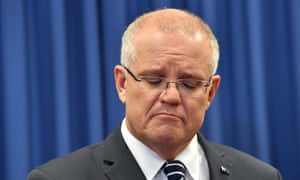Scott Morrison
has been astride the barbed-wire fence for days, refusing to say what
he’ll do about One Nation preferences, despite the moral imperative
being absolutely clear to anyone watching.
The reasons for this are obvious. Morrison, given everything that has led him to this moment – to being prime minister, heading a political movement barely holding it together – does not feel secure enough in his position to be able to issue forceful public demands and assume his backroom organisation, or even senior colleagues, will meekly follow him.
If Morrison had gone out ahead, demanding that One Nation be put below Labor, he would have risked his own people, both parliamentary, and organisational, standing him up, and doing it in highly public fashion.
A Queensland
rebellion – and that was the significant risk – would have projected
further disunity and a corrosive lack of prime ministerial authority,
which is not something the prime minister believes he can afford.The reasons for this are obvious. Morrison, given everything that has led him to this moment – to being prime minister, heading a political movement barely holding it together – does not feel secure enough in his position to be able to issue forceful public demands and assume his backroom organisation, or even senior colleagues, will meekly follow him.
If Morrison had gone out ahead, demanding that One Nation be put below Labor, he would have risked his own people, both parliamentary, and organisational, standing him up, and doing it in highly public fashion.
To put it simply, he believed he had no good choices.
Morrison had a huddle about what to do earlier this week. After Tuesday’s cabinet meeting, the prime minister asked Liberals to stay behind after the regular discussion had concluded to discuss One Nation preferences.
Mathias Cormann suggested the Liberals keep One Nation off their how-to-vote cards in the Senate, but that did not resolve the issue of the lower house. Josh Frydenberg issued something of a general rebuke. He expressed a view that colleagues should not be freelancing in public about this issue.
Kelly O’Dwyer, who had argued publicly before the cabinet meeting that One Nation should be put last, spoke up then, and advocated urgent action. The Liberals needed to spurn One Nation. She said the party had the same opportunity now that John Howard had in the late 1990s. Capping off her contribution, O’Dwyer said the government should not be bullied by the Liberal National party.
Simon Birmingham then backed O’Dwyer’s argument according to people present, arguing forcefully that action was required immediately, in both houses, otherwise the government would be kicked to death in the court of public opinion.
But while the view of moderates from the southern states was clear, Peter Dutton, Michaelia Cash and Angus Taylor took a different position.
They wanted options. They advocated holding on to Morrison’s meaningless “no deals” locution (which was the official holding position) and wait until the nominations closed before making a decision.
Dutton was worried about the electoral fallout for MPs in Queensland if the Liberals forcefully shunned One Nation. He thought the government would lose seats if One Nation retaliated by preferencing against the Liberals, given the protest vote is likely to be high in the coming contest.
There was also a message for Morrison in Dutton’s contribution.
Dutton told colleagues if a general directive was issued, he didn’t know what the LNP would do in response. The implication was the Queensland organisation could easily go rogue.
At the end of the discussion, Morrison told his colleagues the government should only act once in relation to the issue, and that wouldn’t be happening on Tuesday. In the end, he waited until Thursday.
Following the soundings on Tuesday, Morrison has been working with key organisational figures to get to Thursday’s hedged position: One Nation will be put below the Labor party on the Liberal party’s how-to-vote cards.
But Nationals in Queensland will be able to do as they will, and Queensland Nationals have already made their views clear: they will do what they believe is in their electoral interests.
Tuesday’s cabinet discussion provides a window on the internal crosscurrents Morrison is attempting to manage as the electoral clock ticks down.
The bottom line is the prime minister should have done the right thing, and done it days ago, just because it was right.
But Morrison didn’t have the luxury of overestimating his authority, doing something just because it was the right thing to do, because doing the right thing could carry a cost – both personally for him and, potentially, for the government which is now so close to D-day the collective anxiety is palpable.

No comments:
Post a Comment